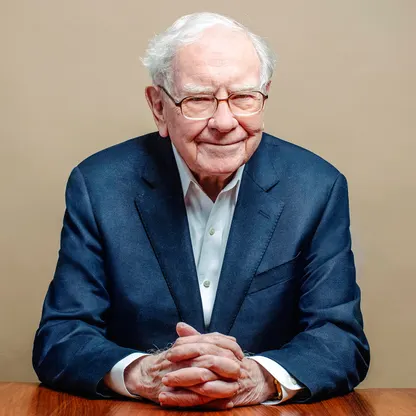Warren Buffett, known as the “Oracle of Omaha,” is one of the most successful investors of all time. As the chairman and CEO of Berkshire Hathaway, he has amassed a fortune by applying fundamental investment principles, focusing on long-term value, and avoiding speculation. His disciplined approach and wisdom have inspired millions worldwide.
This article delves into Buffett’s early life, investment philosophy, and the impact he has had on the financial world.
Early Life and Education
A Passion for Business from a Young Age
Warren Edward Buffett was born on August 30, 1930, in Omaha, Nebraska. His father, Howard Buffett, was a stockbroker and U.S. congressman, influencing Buffett’s early interest in finance and investing. From a young age, Buffett demonstrated a keen business sense, selling chewing gum, Coca-Cola, and magazines door-to-door.
First Steps into Investing
At just 11 years old, Buffett made his first stock market investment, purchasing three shares of Cities Service Preferred for $38 per share. He learned an important lesson when the stock briefly dipped before rising, teaching him the value of patience in investing.
Buffett continued honing his skills by reading investment books, including Benjamin Graham’s “The Intelligent Investor.” His fascination with the stock market led him to pursue higher education in finance.
Education and Mentorship
Buffett attended the University of Nebraska and later enrolled at Columbia Business School, where he studied under Benjamin Graham, the father of value investing. Graham’s principles profoundly shaped Buffett’s investment strategy, emphasizing:
- Buying undervalued stocks with strong fundamentals.
- Focusing on long-term growth rather than short-term speculation.
- Avoiding unnecessary risks and excessive debt.
After graduation, Buffett worked at Graham’s investment firm, further refining his analytical skills before returning to Omaha to start his own investment partnerships.
The Rise of Berkshire Hathaway
Acquiring a Textile Company
In 1965, Buffett took control of Berkshire Hathaway, a struggling textile company. Instead of focusing on textiles, he transformed the company into a massive holding conglomerate by acquiring profitable businesses and investing in undervalued stocks.
Investment Strategy: Value Investing
Buffett’s investment strategy is rooted in value investing, which involves:
- Buying stocks at a discount: Looking for companies trading below their intrinsic value.
- Focusing on strong businesses: Preferring companies with competitive advantages and strong management.
- Long-term thinking: Holding investments for decades to maximize growth.
This strategy has led to remarkable success, with Berkshire Hathaway owning stakes in companies like Coca-Cola, Apple, American Express, and Bank of America.
Major Investments and Acquisitions
Over the years, Buffett has made legendary investments, including:
- Coca-Cola (1988): Investing $1 billion, which grew into one of his most successful holdings.
- Apple (2016): A strategic move that made Apple Berkshire Hathaway’s largest holding.
- Geico: An insurance company that became a core part of Berkshire’s financial empire.
- BNSF Railway: A major acquisition that strengthened Berkshire’s industrial portfolio.
These investments reflect Buffett’s ability to identify undervalued companies with strong long-term potential.
Buffett’s Investment Philosophy

Key Principles of Investing
Buffett follows a set of timeless investment principles:
- Invest in What You Understand: He avoids industries he cannot analyze, preferring businesses with clear, predictable growth.
- Buy and Hold: Buffett rarely sells stocks, believing in long-term wealth accumulation.
- Focus on Quality: He invests in companies with strong brands, loyal customers, and efficient operations.
- Avoid Market Speculation: He disregards short-term market trends and hype, emphasizing intrinsic value.
- Be Fearful When Others Are Greedy: Buffett advises buying during market downturns and exercising caution when markets are overly optimistic.
The Role of Patience and Discipline
Buffett’s patience and discipline set him apart. Unlike many investors who chase quick gains, he waits for the right opportunity and holds onto quality investments for decades. His approach proves that long-term thinking leads to superior financial results.
The Impact of Warren Buffett
Inspiring Future Investors
Buffett has influenced countless investors, from Wall Street professionals to everyday individuals. His annual shareholder letters and public statements provide invaluable investment insights.
Philanthropy and Giving Back
Beyond investing, Buffett is a dedicated philanthropist. He co-founded The Giving Pledge, promising to donate most of his wealth to charitable causes. His generosity has contributed billions to education, healthcare, and global development initiatives.
Challenges and Legacy
Challenges in Modern Investing
As markets evolve, some question whether Buffett’s traditional approach remains relevant. However, his focus on value, patience, and sound decision-making continues to prove effective, even in today’s fast-paced financial world.
A Lasting Legacy
Warren Buffett’s legacy extends beyond wealth. He has shown that integrity, discipline, and a long-term vision lead to financial success. His principles will guide generations of investors for years to come.
Conclusion
Warren Buffett’s journey from a young entrepreneur to a global investment icon is a testament to the power of patience, discipline, and intelligent investing. His insights continue to shape the financial world, making him one of the most respected figures in business history.
As he once said: “The stock market is designed to transfer money from the Active to the Patient.” Buffett’s life and work exemplify this philosophy, offering a roadmap for anyone seeking long-term financial success.
Also Read : Larry Page and Sergey Brin: The Search Engine Innovators






